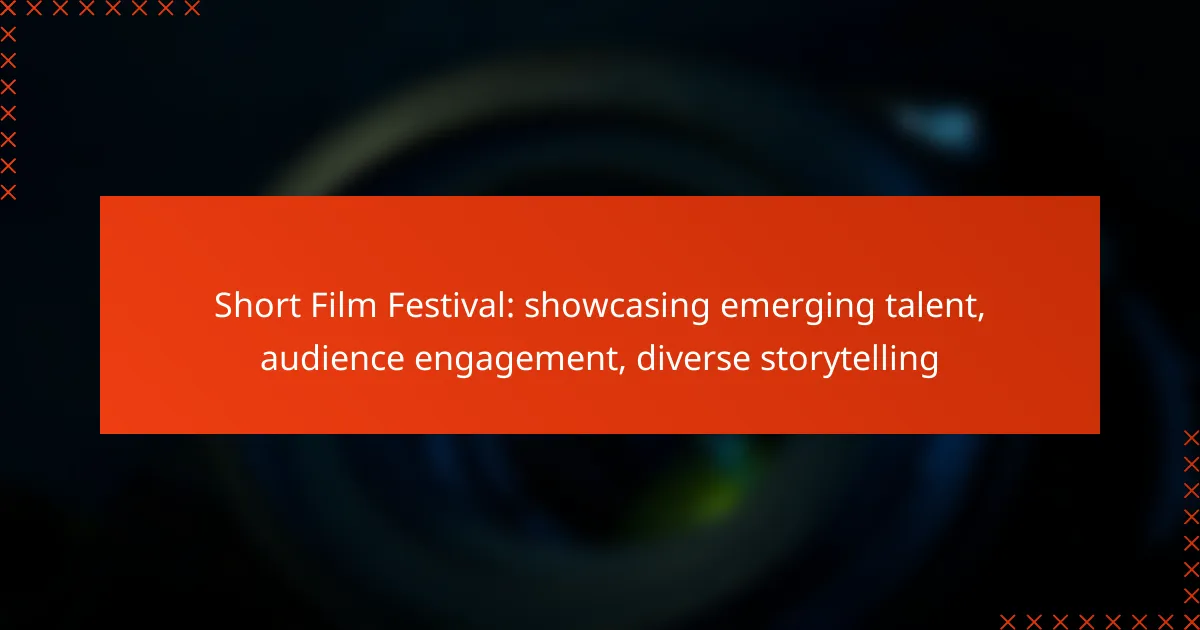The Retrospective Film Festival in Australia celebrates the historical significance of classic cinema by showcasing films that have shaped the industry and influenced modern filmmaking. This event not only fosters a deeper appreciation for the art of filmmaking but also connects audiences with the rich heritage of cinema through screenings, discussions, and workshops.
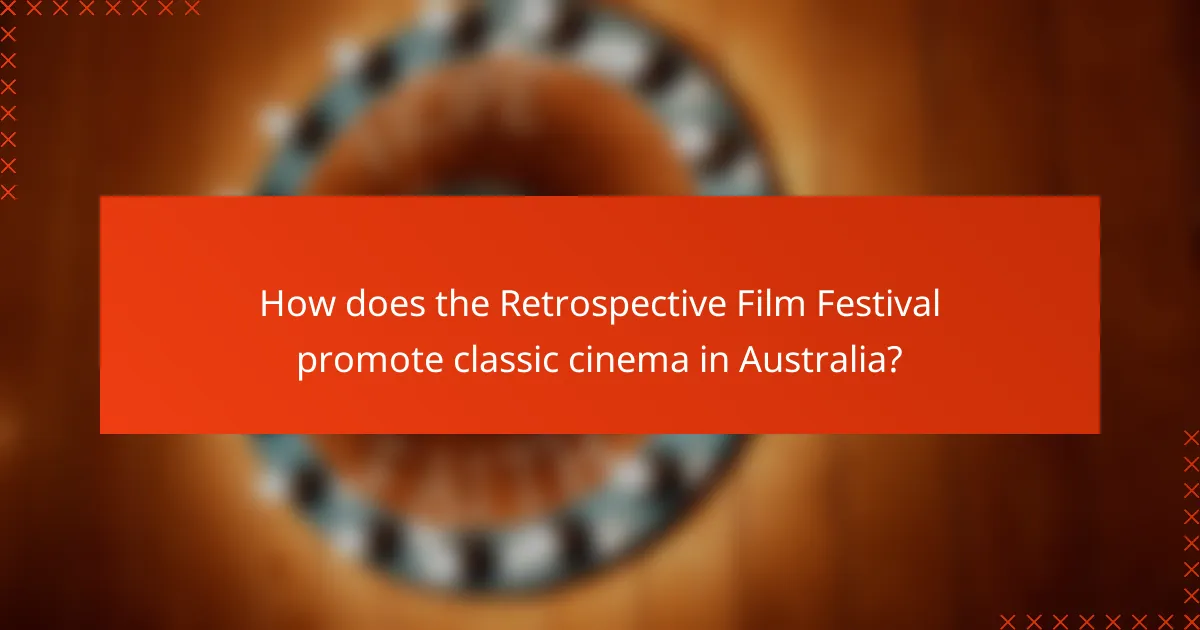
How does the Retrospective Film Festival promote classic cinema in Australia?
The Retrospective Film Festival in Australia promotes classic cinema by showcasing significant historical films, fostering a deeper appreciation for the art of filmmaking, and facilitating discussions with filmmakers. This festival serves as a platform to connect audiences with the rich heritage of cinema, enhancing cultural understanding and enjoyment.
Showcases historical films
The festival features a curated selection of historical films that have shaped the cinematic landscape. By screening classics from various eras, it allows audiences to experience the evolution of film techniques, storytelling, and cultural narratives. This exposure helps viewers recognize the influence of these films on contemporary cinema.
Examples of showcased films often include influential works from the early 20th century to the 1980s, such as silent films, film noir, and groundbreaking foreign cinema. Such selections not only entertain but also educate audiences about the historical context in which these films were made.
Encourages film appreciation
Through its programming, the festival encourages a greater appreciation for the artistry involved in filmmaking. By presenting classic films alongside contemporary discussions, it highlights the craftsmanship of directors, writers, and actors who contributed to these timeless works. This approach fosters a deeper understanding of film as an art form.
Workshops and panels often accompany screenings, allowing attendees to engage with the themes and techniques used in classic films. Participants can learn about cinematography, editing, and sound design, enhancing their overall viewing experience and appreciation for the medium.
Hosts discussions with filmmakers
The festival frequently hosts discussions featuring filmmakers, critics, and scholars who provide insights into the films being screened. These discussions offer audiences a chance to delve into the creative processes behind classic films and understand their historical significance. Engaging with industry professionals enriches the viewing experience.
Attendees can ask questions and participate in conversations that explore the impact of these films on society and culture. This interaction not only deepens appreciation but also fosters a community of film enthusiasts who share a passion for classic cinema.
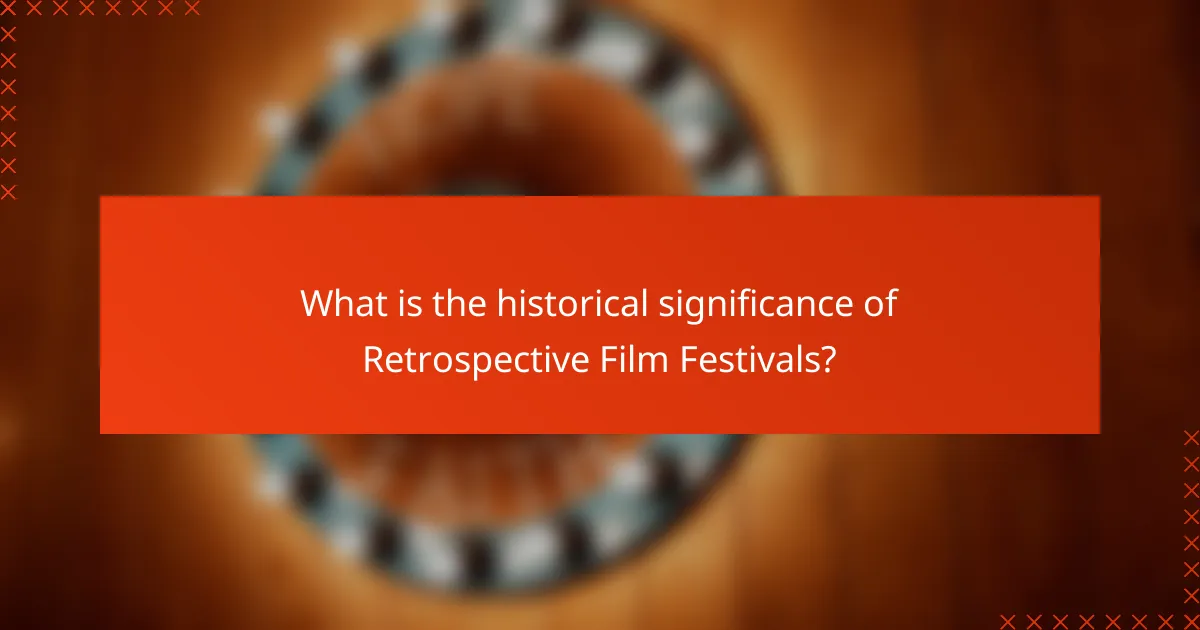
What is the historical significance of Retrospective Film Festivals?
Retrospective Film Festivals play a crucial role in celebrating and preserving the history of cinema. They provide audiences with the opportunity to experience classic films that have shaped the industry and influenced contemporary filmmaking.
Preserves cinematic heritage
Retrospective Film Festivals serve as vital platforms for preserving cinematic heritage by showcasing films that may otherwise be forgotten. These festivals often feature restored versions of classic films, ensuring that future generations can appreciate the artistry and cultural significance of earlier works.
By curating selections from various eras, these festivals highlight the evolution of film techniques, storytelling, and societal themes. This preservation effort not only honors the past but also enriches the current film landscape.
Highlights influential directors
Retrospective Film Festivals often focus on the works of influential directors, providing insight into their unique styles and contributions to cinema. By screening a director’s body of work, audiences can gain a deeper understanding of their artistic vision and the impact they have had on the film industry.
These festivals may include panel discussions, Q&A sessions, or workshops featuring filmmakers and critics, allowing attendees to engage with the material on a more personal level. This interaction fosters a greater appreciation for the craft and encourages dialogue about the director’s legacy.
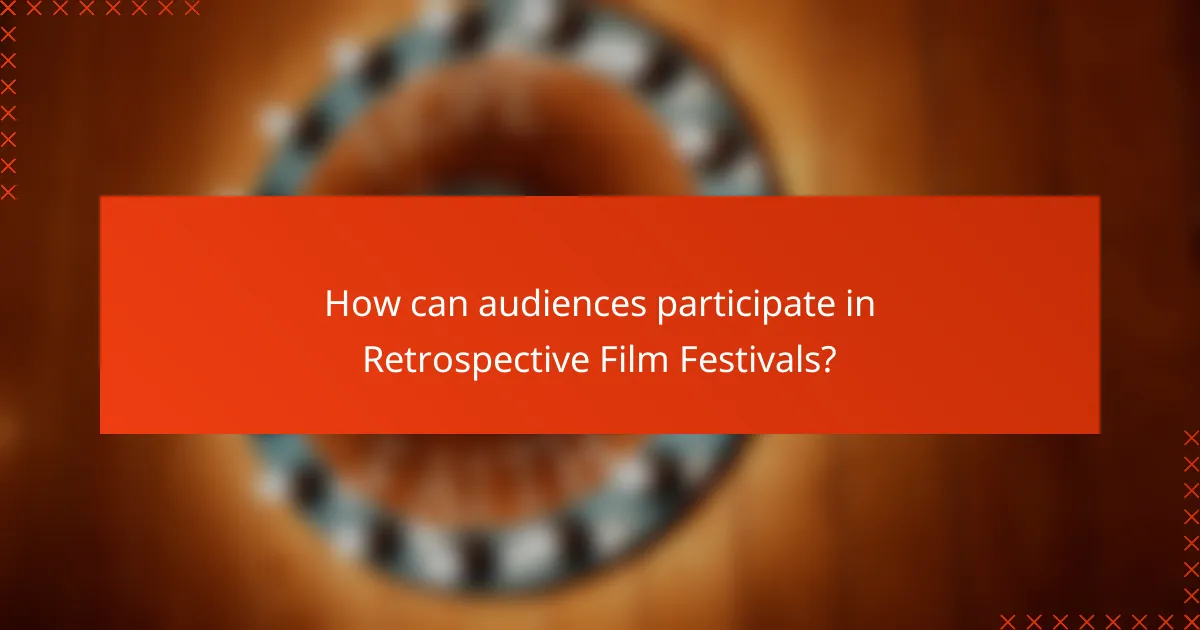
How can audiences participate in Retrospective Film Festivals?
Audiences can participate in Retrospective Film Festivals by attending screenings, engaging in discussions, and joining workshops focused on classic cinema. These events provide a unique opportunity to appreciate historical films and connect with fellow film enthusiasts.
Attend screenings in major cities
Screenings of retrospective films are often held in major cities, showcasing classic cinema in theaters that specialize in film history. Cities like New York, Los Angeles, and London frequently host these festivals, allowing audiences to experience films on the big screen as they were originally intended.
Tickets can vary in price, typically ranging from $10 to $20 per screening, depending on the venue and film. It’s advisable to check the festival’s schedule in advance to secure seats for popular films, as they can sell out quickly.
Engage in Q&A sessions
Many retrospective film festivals include Q&A sessions with filmmakers, critics, or film historians after screenings. These discussions provide valuable insights into the film’s context, production, and impact on cinema history.
Participating in these sessions enhances the viewing experience, allowing audiences to ask questions and gain deeper understanding. Be prepared to engage respectfully and thoughtfully, as these interactions can enrich your appreciation of the films.
Join film appreciation workshops
Film appreciation workshops are often offered during retrospective festivals, focusing on specific genres, directors, or historical contexts. These workshops provide a structured environment to explore films more deeply, often featuring screenings followed by discussions.
Workshops may have a fee, typically ranging from $30 to $100, depending on the length and content. They are a great way to meet other film lovers and learn from knowledgeable instructors, enhancing your overall festival experience.

What are the key criteria for selecting films in these festivals?
Key criteria for selecting films in retrospective film festivals include cultural significance, artistic innovation, and historical relevance. These factors help curators choose films that not only represent classic cinema but also contribute to film appreciation and understanding of cinematic evolution.
Cultural impact and relevance
Cultural impact is a primary criterion for film selection in retrospective festivals. Films that have influenced societal norms, sparked conversations, or reflected pivotal moments in history are often prioritized. For example, movies that address social issues or showcase significant cultural movements can resonate deeply with audiences, enhancing their appreciation of film as a cultural artifact.
Relevance to contemporary audiences is also crucial. Curators often consider how a film’s themes and messages relate to current societal contexts, making classic cinema accessible and engaging for modern viewers. This connection can foster a deeper understanding of both the film and its historical backdrop.
Artistic merit and innovation
Artistic merit involves evaluating a film’s technical and creative achievements, such as direction, cinematography, and storytelling. Films that pushed boundaries or introduced new techniques often receive special attention. For instance, works by directors known for their innovative styles, like Alfred Hitchcock or Orson Welles, are frequently featured due to their lasting influence on filmmaking.
Innovation is another critical aspect, as it highlights films that have introduced groundbreaking ideas or aesthetics. Curators look for films that not only reflect the artistic trends of their time but also set new standards for future filmmakers. This focus on innovation helps audiences appreciate the evolution of film as an art form.
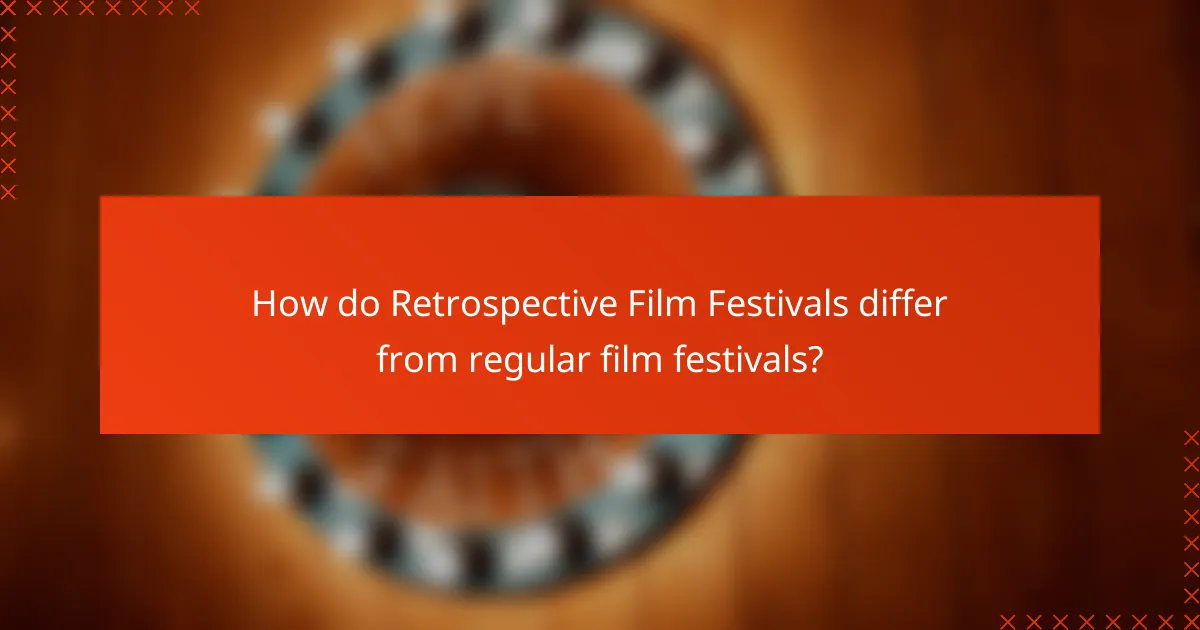
How do Retrospective Film Festivals differ from regular film festivals?
Retrospective film festivals focus on showcasing films from the past, often highlighting significant historical, cultural, or artistic contributions. Unlike regular film festivals that primarily feature new releases, retrospectives provide audiences with a chance to appreciate classic cinema and understand its context within film history.
Focus on historical context
Retrospective film festivals emphasize the historical significance of the films they present. This often includes screenings of influential works that shaped the film industry or reflected societal changes at the time of their release. By providing context through discussions, panels, or curated notes, these festivals help audiences grasp the impact of these films on contemporary cinema.
For example, a retrospective might feature films from the silent era, accompanied by lectures on the evolution of filmmaking techniques and storytelling. This approach allows viewers to appreciate how past films laid the groundwork for modern cinematic practices.
Emphasis on classic cinema
Classic cinema is at the heart of retrospective film festivals, showcasing films that have stood the test of time. These festivals often include iconic works from various genres and eras, allowing attendees to experience the artistry and innovation of earlier filmmakers. The selection typically spans several decades, offering a diverse range of styles and narratives.
Common pitfalls for attendees include overlooking the importance of context when viewing these classics. Engaging with supplementary materials, such as director interviews or historical analyses, can enhance understanding and appreciation. Festivals may also host Q&A sessions with film scholars or critics, providing deeper insights into the films being screened.
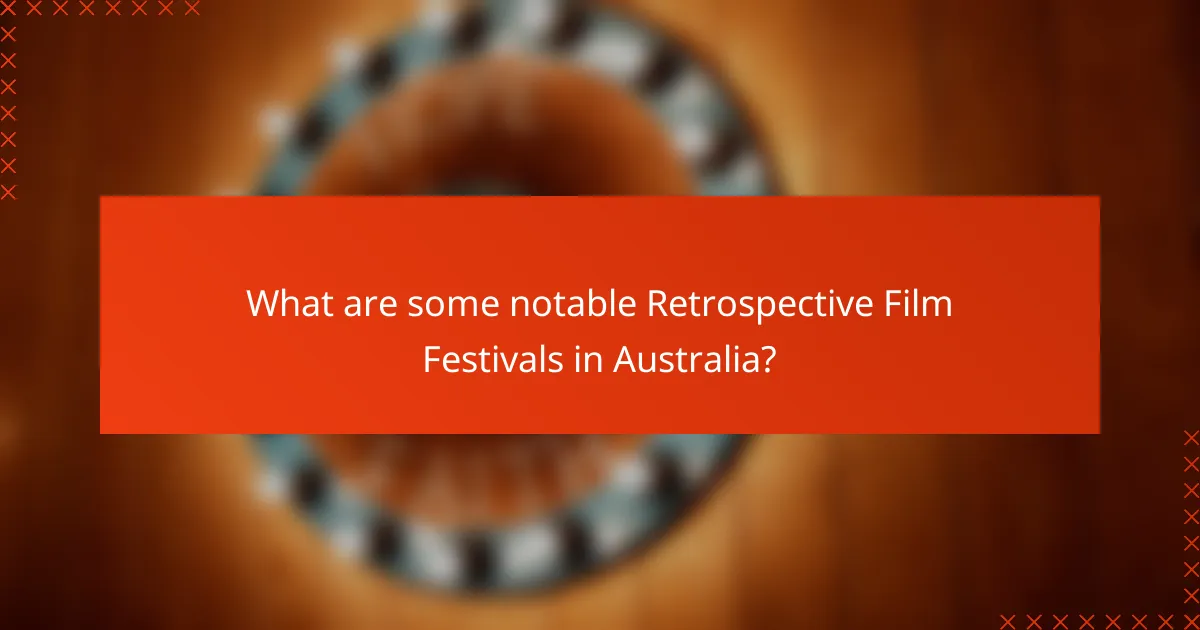
What are some notable Retrospective Film Festivals in Australia?
Australia hosts several notable retrospective film festivals that celebrate classic cinema and its historical significance. These festivals provide a platform for film appreciation, showcasing influential works from various eras and genres.
Melbourne International Film Festival
The Melbourne International Film Festival (MIFF) is one of the largest and most prestigious film festivals in Australia, often featuring a selection of classic films alongside contemporary works. MIFF typically includes retrospectives that focus on significant filmmakers or movements, allowing audiences to explore the evolution of cinema.
Attendees can expect screenings of restored classics, panel discussions, and Q&A sessions with filmmakers or film historians. This festival usually takes place in August and offers a rich program that appeals to both casual viewers and serious cinephiles.
Sydney Film Festival
The Sydney Film Festival is another key event that highlights retrospective cinema, showcasing a diverse range of classic films from around the world. This festival often features thematic retrospectives, focusing on specific genres, directors, or cultural movements, which provide deeper insights into the history of film.
Typically held in June, the Sydney Film Festival includes screenings, special events, and discussions that enhance the viewing experience. It’s an excellent opportunity for film enthusiasts to engage with the art of cinema and appreciate its historical context.
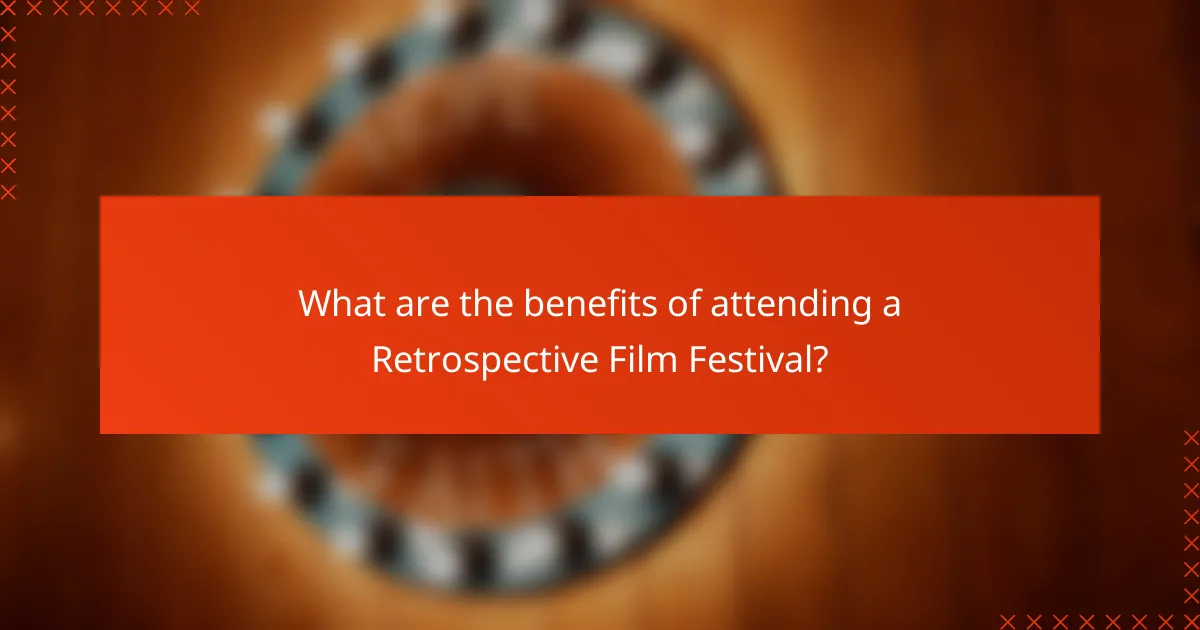
What are the benefits of attending a Retrospective Film Festival?
Attending a Retrospective Film Festival offers unique insights into classic cinema and its historical context, enhancing film appreciation. These festivals provide a platform for audiences to engage with significant films that have shaped the industry over time.
Deepens understanding of film history
Retrospective Film Festivals showcase a curated selection of films from various eras, allowing attendees to explore the evolution of cinematic techniques and storytelling. By viewing these classics, audiences can better appreciate the artistic and cultural influences that have shaped modern filmmaking.
For example, a festival might feature silent films alongside early sound films, highlighting the technological advancements and shifts in narrative style. This exposure helps viewers connect the dots between past and present cinematic practices.
Fosters community among film lovers
These festivals create a shared space for film enthusiasts to gather, discuss, and celebrate their passion for cinema. Attendees often engage in conversations about their favorite films, directors, and genres, fostering connections that can last beyond the festival.
Participating in panel discussions or Q&A sessions with filmmakers and critics can enhance this sense of community. Such interactions provide opportunities for networking and exchanging ideas, enriching the overall experience for film lovers.
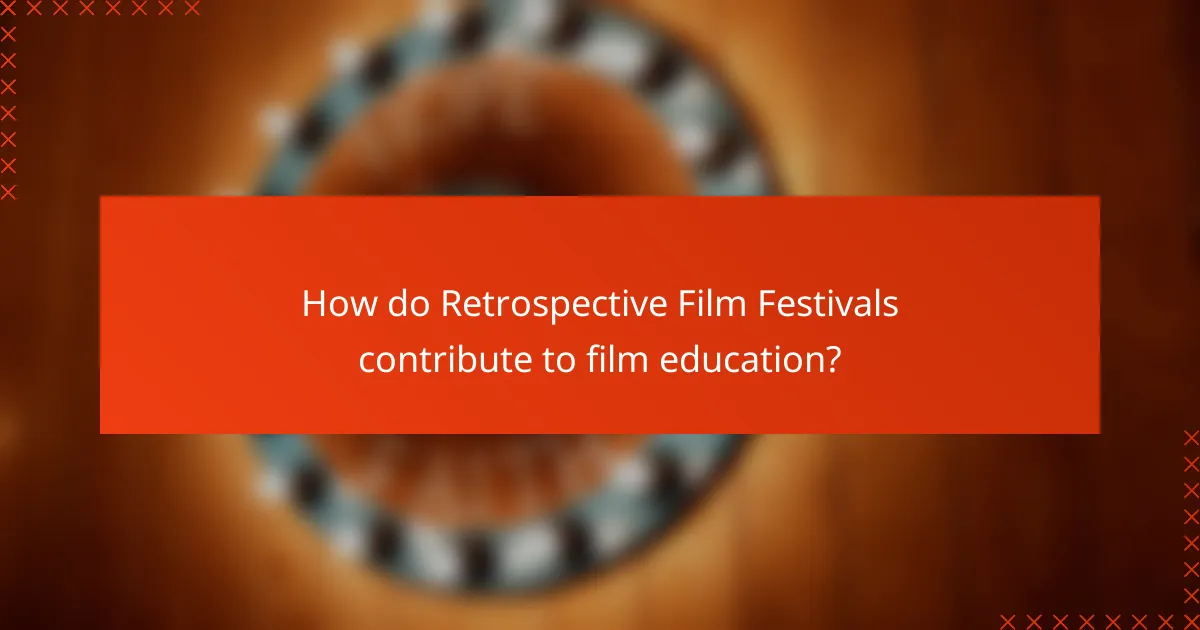
How do Retrospective Film Festivals contribute to film education?
Retrospective film festivals play a crucial role in film education by showcasing historical films that highlight significant movements, styles, and cultural contexts. These festivals provide audiences with opportunities to engage with classic cinema, fostering a deeper appreciation for the art of filmmaking and its evolution over time.
Historical Context
Retrospective film festivals often focus on specific eras, genres, or filmmakers, providing valuable historical context that enriches viewers’ understanding of cinema. By screening films from various decades, these festivals illustrate how societal changes influence film narratives and styles.
For example, a festival dedicated to films from the 1970s may highlight the rise of independent cinema and the impact of political movements on storytelling. This context helps audiences grasp the significance of these films beyond mere entertainment.
Film Appreciation
Attending retrospective film festivals enhances film appreciation by allowing audiences to experience classic works on the big screen, often accompanied by discussions or panels with filmmakers and scholars. This immersive experience fosters a greater emotional connection to the films and their creators.
Viewers can learn to recognize cinematic techniques, themes, and innovations that have shaped modern filmmaking. Engaging with experts during Q&A sessions can also deepen understanding of the artistic choices made in these influential works.
Educational Programming
Many retrospective film festivals include educational programming, such as workshops, lectures, and panel discussions, aimed at both aspiring filmmakers and film enthusiasts. These programs often cover topics like film analysis, directing, and screenwriting, providing practical insights into the filmmaking process.
For instance, a workshop on editing might use classic films as case studies to illustrate how editing choices affect narrative pacing and viewer engagement. This hands-on approach equips participants with skills they can apply in their own projects.

